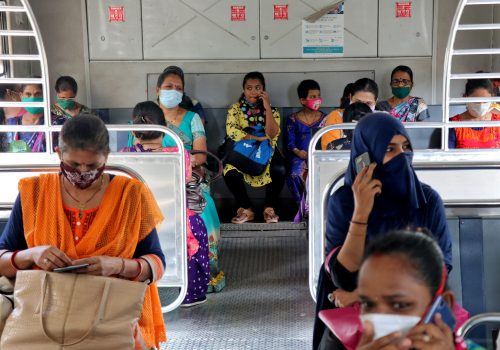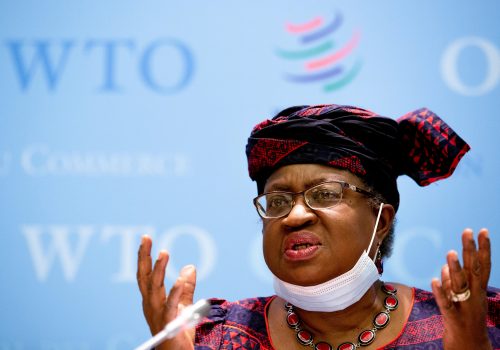The future is here: A guide to the post-COVID world 07/17/2021
Welcome to your guide to where the world is headed during the pandemic era and beyond, from Andrew Marshall. Each week, we’ll bring you the latest and most significant expert insights and international news about how coronavirus is reshaping international affairs. To stay updated each week, sign up to the newsletter here.
Let’s take a spin around the globe, in seven minutes or less.
In top stories this week:
- England pulls back on COVID-19 restrictions while France hikes vaccine requirements.
- South Korea’s new strategy to curb COVID-19: Drop the beats (per minute).
- As the Tokyo Olympics begin, Japan is still in a state of emergency.
- But first…
The big story
This week’s key theme: The rumored urban exodus may be the biggest pandemic myth.
People are heading back to the big cities. In fact, many never went far.
There were many predictions a year ago that the great metropolises of the Western world would soon be deserted and destitute as COVID-19 wreaked havoc. “From the moment U.S. coronavirus cases emerged in the Seattle area and then devastated New York City last spring, sweeping predictions about the future of city life followed…” reports Emily Badger of the New York Times. “The pandemic promised nothing short of the End of Cities, a prophecy foretold by pundits, tweets and headlines, at times with unveiled schadenfreude.”
That promise hasn’t panned out. Friends in the New York area report that the city remains a largely civilized place, or at least no less so than it was pre-pandemic. Some favorite restaurants and bars have gone, and there is certainly plenty of retail space available. But “food and beverage tenants were the most active in signing retail leases across Manhattan during the second quarter, according to commercial real estate services firm CBRE,” reports CNBC.
“It seems like this spring, after the vaccine had become widely available, people really started to stream back to the city from wherever they were living,” says New York Magazine’s Kim Velsey. “People who’d spent a year living with their parents or extended families were ready to live among friends, to socialize, to experience something close to their former life.”
There has been movement from cities to suburbs and to smaller towns further out in the countryside. But the idea of a massive shift away from the city to green fields and country lanes has been rewritten.
“The pandemic accelerated existing migration out of big cities into lower-density communities across the US and boosted demand for larger homes and increased residential mobility across neighborhoods. What it did not do was bring about the end of urbanization,” says a study from Freddie Mac.
“The invisible elastic that binds people to big cities has weakened rather than broken,” says the Economist, which put two researchers to work analyzing data from real estate website Zillow. “Covid-19 has not cancelled the appeal of the centres of the biggest cities. People still want to be near them, perhaps to commute a few days a week. They just don’t want to be in them.”
Citing recent Bank of America research, Business Insider says that “while the pandemic accelerated preexisting migration out of cities like New York City and San Francisco, those two are the only true examples [in the United States] of anything resembling an exodus, and reopening will spark a return to both cities.” Bank of America said urban exodus is “more myth than reality.”
The biggest analysis I could find is by Bloomberg, which parses data from the US Postal Service on changes of address and mail forwarding. “There is no urban exodus; perhaps it’s more of an urban shuffle,” it says. “Despite talk of mass moves to Florida and Texas, data shows most people who did move stayed close to where they came from—although Sun Belt regions that were popular even before the pandemic did see gains.”
Bloomberg continues, “Those Americans who did move accelerated a trend that predates the pandemic: Dense core counties of major U.S. metro areas saw a net decrease in flow into the city, while other suburbs and some smaller cities saw net gains. In other words, people moved outward. Outward to the suburbs of their own core metro area, but also farther out, to satellite cities or even other major urban centers that might still give people proximity to their region.”
One thing is clear though. Real estate prices have soared, as the wealthy in particular have bought new homes, trading up and often getting out of the city. The causes are a massive surge in demand, especially from the rich, a lack of supply that goes back to the 2008 Global Financial Crisis, and very low interest rates.
“Wealthier households have channelled windfall savings into equities and cryptocurrencies, Louis Vuitton handbags and Dutch masters. But most of all, they have poured money into buying bigger and better houses,” reports the Financial Times.
This has disproportionately hit lower-income and first-time buyers. “One of the most prominent housing issues in pre-pandemic America was supply shortages,” Matthew Murphy, executive director of the Furman Center For Real Estate and Urban Policy at New York University, tells NBC News. “That has carried over and exacerbated, but we already had evidence of supply shortages heading into the pandemic.”
As in other areas of socio-economic change, there are signs that COVID-19 hastened changes that were already under way—but also that its short-term effects might not persist. “I think it’s becoming more and more clear that the pandemic mainly pushed people out of New York who didn’t really want to be in New York before the pandemic, people who were already kind of eyeing the suburbs. Or Kingston [New York],” says Velsey. “Or Austin.”
There is little more hurtful than to accuse a New Yorker of really wanting to live in Texas; but perhaps that was true, for some.
Subscribe to The future is here: A guide to the post-COVID world
Sign up for a weekly roundup of top expert insights and international news about how coronavirus is reshaping international affairs.

The world in brief
Insights from across the planet, in ten bullets or fewer
- England’s COVID-19 restrictions are over, but the pandemic isn’t. England will enter its final stage of easing COVID-19 restrictions on Monday, the government has announced. Experts, however, are urging caution: Chris Whitty, chief medical officer, says the country will face an inevitable “exit wave” of infections.
- France is cranking up its COVID-19 rules. In a speech ahead of France’s national day, President Emmanuel Macron announced forthcoming vaccination mandates, particularly for health workers, and turned up the pressure on unvaccinated people by requiring proof of vaccination to visit restaurants, cafes, and shopping centers. In his televised address, Macron dubbed vaccines “a key asset” in fighting “a strong resurgence of the epidemic,” reports the New York Times. The news fueled a mad dash among French citizens to get their shots, with more than one million signing up for vaccine appointments in less than a day, the Associated Press reports.
- South Africa’s COVID-19 ordeal is monumental. The virus “may have dealt South Africa a blow that even AIDS could not, driving the country of my birth down the path of madness, a society slumping into the abyss…” writes journalist Farhad Manjoo in a moving piece in the New York Times. “Thanks to mass vaccination, it’s beginning to feel like morning in wealthy parts of the world, notwithstanding the social and political dislocations the virus has created in the United States. But on much of the rest of the planet it is still dark night.”
- Cases of COVID-19 in Japan have hit a six-month high, with the Olympics set to open in a week. “Tokyo is under a fourth state of emergency, which began Monday and requires restaurants and bars to close early and not serve alcohol through the Olympics, which start July 23,” reports ESPN.
- South Korea slows down for COVID-19. South Korea has banned fast music and fast running at some fitness clubs. “The concern is that intense exercising, especially in a group setting, could increase the likelihood of stray respiratory droplets and that all the sweat-and-spit slinging could lead to more COVID-19 cases,” explains National Public Radio. As a result, “gyms in the capital Seoul and other nearby areas are no longer allowed to play music faster than 120 beats per minute (the speed of “Call Me Maybe” by Carly Rae Jepsen) during group fitness classes.”
- New York’s comedy clubs are reopening. Manhattan’s renowned comedy venues welcomed back familiar faces like Jerry Seinfeld, Dave Attell and [Gilbert] Gottfried in recent weeks,” says the New York Daily News. Comedy Cellar owner Noam Dworman recalled having “seen speculation about the culture changing for good with the pandemic—no hugs, no handshaking. And that lasted all of 20 seconds. People hugging, shaking hands, crying. It was elation. Very emotional all around.”
The inside scoop
Insights from the Atlantic Council
Andrew Marshall is the Vice President of Communications for the Atlantic Council. He leads the Council’s media, digital, and editorial efforts, and coordinates the way the Council talks with its key communities.


